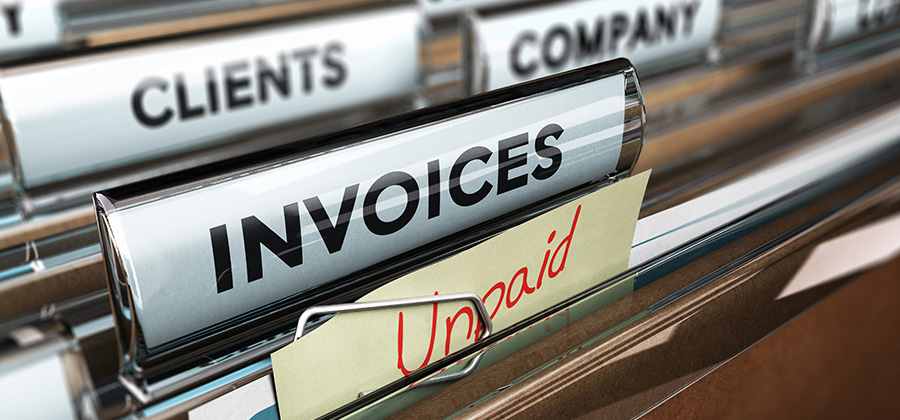Less risk, more working capital and, more especially, more time to focus on your core business. These are but a few of the benefits of factoring.

Do you frequently have a problem with unpaid invoices or late payment by your debtors, and does chasing this take a lot of time that could be devoted to selling?
Would you like to avoid the risk of non-payment and free up extra resources? If so, factoring could be the solution.
What are the advantages of factoring for your company?
You save time and money
By assigning your receivables administration to an external partner you can convert fixed costs to variable costs. Not only do you reduce your general operating costs and staff expenses, but you no longer need to constantly invest in new or changing technologies. You will also experience fewer problems in the event of extended absence, the departure of administrative staff or a temporary increase in the workload. However, the major advantage is that you have more opportunity to expand your business because you can devote more time to your customers.
You avoid non-payment
Because the factoring company examines your receivables portfolio thoroughly, you have a better idea of your debtors' creditworthiness. This screening can also apply to your domestic and foreign prospects. This means you always operate on the basis of reliable trade information and don't waste time and energy on high-risk debtors. And thanks to its expertise, the factoring company will also be able to act more quickly to stop any attempts at fraud.
If you also opt for cover for the risk of non-payment, you can obtain up to 100% cover for default. In this way you avoid cash-flow problems due to unpaid invoices and protect your investment in your company. Because the factoring company pays you the compensation after a pre-arranged deadline, you can have more reliable cash planning.
You free up more working capital
Debtors tend to pay their invoices more quickly to a factoring company than directly to the supplier. As a result, the average "days sales outstanding" (DSO) of your receivables is lower, which means your company needs less additional financing and therefore makes a direct saving on interest.
What's more, you collect payment more quickly without putting pressure on your debtors or tightening up your payment terms, which is always delicate in a commercial relationship.
If you also receive advances on your invoices from the factoring company, you avoid pressure on your cash flow. That is because your financing is linked to your turnover, so you can always cover any extra requirement for working capital based on your receivables.
You have a stronger negotiating position due to better ratios
Under certain circumstances, factoring products with risk cover make it possible for you to work off-balance-sheet. This means your balance sheet is more concise, your net debt is reduced, and your company's liquidity and solvency ratios improve. As well as having a positive impact on the cost of service from your bank, this also influences your suppliers, major debtors and credit insurance companies when assessing their risks.
You can keep close track of your debtors
Thanks to the online monitoring and reporting, you can keep up to date with changes in your receivables portfolio. For instance, you can consult information on outstanding invoices, credit notes, payments and disputes at any time and you know the exact state of your cash flow.
And for your debtors?
- Thanks to the intervention of the factoring company, you have more certainty of payment, which means you can offer your debtors longer payment terms.
- With every collection, the factoring company provides your debtor with clear reports, so that it is easy for them to keep a track of their payments.
- Foreign debtors don't have to provide supplementary guarantees.
01.02.2016
How does factoring work?
The principle behind factoring is simple: you assign your receivables (invoices) to a third party – the factor – with or without cover for the risk of non-payment. When you send your invoice to the debtor, the factoring company can pay an advance of up to 85% of the amount. That means you don't have to wait for payment and have immediate access to the funds. The factoring company is also responsible for monitoring and collection.
You have the option of using the following services, depending on your company's specific requirements:
Outsourcing of your accounts receivable administration
If you select this option, you assign all or some of your receivables file to the factoring company in exchange for a factoring fee. The factoring company performs the following tasks:
- entering invoices and credit notes after a thorough check and then updating the debtor data;
- checking and allocating incoming payments, including a check on partial payments and payment or invoice references;
- drafting and providing online reports and statistics, so that you always have a clear idea of the status of outstanding receivables and payments already received.
Good to know
The factoring company performs a thorough analysis before taking over your accounts receivable. It may decide to exclude some debtors contractually, for instance if they have a particularly poor credit rating, if they are natural persons or associated enterprises, operate in countries with a high default risk or have stated that they do not wish to pay via factoring.
Monitoring and collection of your outstanding invoices
In this case, the factoring company is responsible for collection of your outstanding receivables and following up on debtors by phone and with written reminders. This means you have more time to build up good relationships with your customers.
In practical terms, you issue your invoices and send them electronically from your accounting program to the factoring company, which is then responsible for collection and follow-up. Because of its expertise and experience, the factoring company is generally able to collect payment of the invoices 25% more quickly than your own accounts department. And as a third party, it is often more successful when it comes to payment notices.
You can track the entire process via an online application, so you are always aware of changes in your receivables portfolio. For instance, you can consult detailed information on your outstanding invoices, credit notes, payments and disputed payments at any time.
Advances based on the amounts of your invoices
In addition to outsourcing their receivables management, many companies that use factoring also call upon advances based on their outstanding invoices.
In this case the factoring company advances a percentage of the invoice amount (usually between 75% and 85%) immediately after receipt of the invoice. You receive the balance when the debtor has paid the factoring company. You pay interest on the amount advanced.
This form of advance has distinct advantages:
- You generate additional working capital on the basis of your outstanding receivables.
- You improve your cash position, so it is easier to invest or enter new markets. In addition, as a quick payer you can request healthy discounts from your suppliers.
- There is a direct link between your available funds and turnover growth: more sales means more funding for your company's continued growth.
Cover for the non-payment risk
Factoring companies offer various packages so that you can obtain 100% cover for the risk of non-payment of your outstanding invoices. That means you don't have to worry about the possibility of your debtors defaulting. This additional certainty of payment also makes it easier for you to offer more flexible payment terms, which could give you a considerable competitive edge.
The following risks are covered:
- Proven insolvency, for instance as a result of bankruptcy or judicial settlement.
- Probable insolvency: when the debtor has still not paid within a contractually agreed deadline after the due date of the invoice (usually ninety days).
If one of your debtors defaults, the factoring company will pay the entire amount of the invoice, within the predetermined credit limits, within the agreed deadline after the due date of the invoice.
Good to know
A credit insurance policy is also particularly useful to safeguard your export transactions.Through the credit insurer, you have access to:
- information on the credit ratings of your foreign debtors
- information on the specific risks associated with the country of destination
- bank and customs guarantees with your foreign trading partner
- a collection service if your foreign debtors don’t pay their invoice
01.02.2016
Factoring: what about the risks?
By outsourcing your billing, you can save a lot of time, energy and resources. But what about the risk?

That depends on the agreement you have entered into with the factoring company:
- With non-recourse factoring, you assign the risk of non-payment of the invoices to the factoring company. This means provision of cover for non-payment up to 100% of the amount of the receivable, but within predefined limits.
- With recourse factoring, your company bears the risk of non-payment of invoices. If the factoring company doesn't manage to obtain payment from a debtor after a certain time and repeated reminders, it will claim the amount concerned from you.
In that case, you will have to try to obtain payment of the outstanding amount from the debtor concerned through judicial collection. You can call upon the services of a bailiff or collection agency for this, but most factoring companies also offer this service.
In its risk assessment and pricing, the factoring company will of course also take account of the quality of the receivables portfolio.
01.02.2016
Cross-border factoring: better risk management
If you do business abroad, and particularly if you export, it is also advisable to transfer the monitoring, risk cover and funding of your foreign receivables to a factoring company. Why choose cross-border factoring?
- Default cover, since it is not always easy to assess a foreign debtor's creditworthiness.
- Legislation and trading practices regarding billing can vary considerably from one country to another. If you handle collection yourself from Belgium, lack of knowledge of local practices could cause problems.
- Better risk management. If your foreign debtor goes bankrupt, the local branch of your factoring company has a stronger legal basis to collect any outstanding invoices.
The actual services offered by the factoring company depend on how your company operates.
- You export and bill your foreign debtors yourself
In that case, the factoring company can collect and monitor receivables in most countries and provide funding and cover. This is done through a network of affiliated companies or correspondent factoring companies. - You issue invoices through your foreign subsidiaries
In that case, the factoring company will offer your various subsidiaries a factoring agreement through own its local units. That means your local staff can call on the services of local experts, using their own language and in accordance with local trading practices.
01.02.2016
Is factoring also suitable for your company?
Answering this question is not as simple as it might at first seem. Our brief questionnaire can provide an indication.

- Is your company's turnover more than EUR 500,000?
- Are you looking for solutions for:
- unpaid invoices or late payments by your debtors?
- the monitoring of your outstanding receivables portfolio, because it takes up too much time?
- cover against non-payment by your debtors?
- generating additional working capital?
- Would you always like:
- an overview of your outstanding receivables portfolio?
- an adequate view of your debtors' financial situation?
- certainty of payment by your debtors?
- access to funding based on your outstanding receivables, so that you can offset production peaks or seasonal variations, for instance?
If your answer to these questions is “yes”, factoring may well be an attractive option for your company. Whether you actually qualify, particularly for financing or advances, depends on the “factorability” of your receivables.
Factorability
Factorability indicates how sure the factoring company is that they will be able to recoup an advance on an invoice by actually collecting the invoice amount. The following are some criteria that could have a negative impact on factorability:
- concentration in your receivables portfolio, with – for example – a single debtor accounting for 15% or more of the outstanding receivables
- you bill private individuals
- you grant exceptionally long payment terms
- you often bill in tranches or issue advance invoices
- you work on the basis of forward invoicing or pre-invoicing
- you issue guarantee invoices or work with consignment deliveries
- you are a registered contractor
- you issue invoices to debtors operating in certain sectors – for example, it is very difficult to issue invoices in the agricultural sector, where cash payment is often common practice
- your debtors operate in countries that do not qualify for factoring (especially in Africa and South America, where there are no factoring companies)
These are not absolute exclusion criteria; the factoring company will examine each case separately. However, they will never accept receivables under the following conditions:
- the supplier has a commercial or personal interest in the invoiced company
- the debtors are also creditors (counterclaims)
